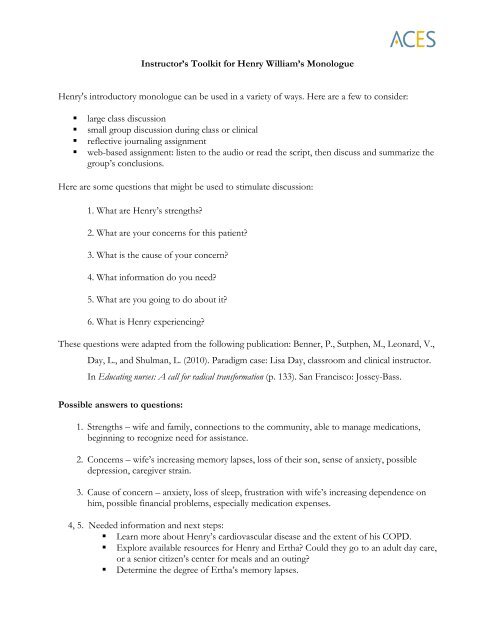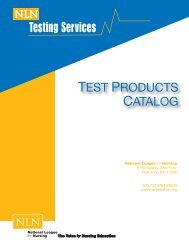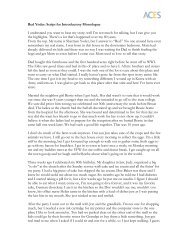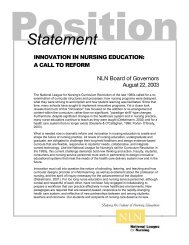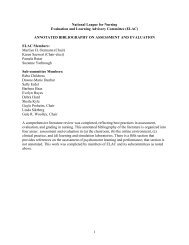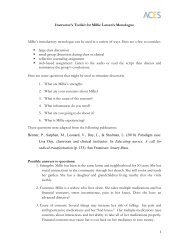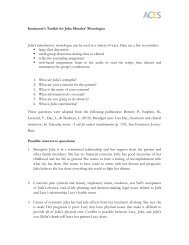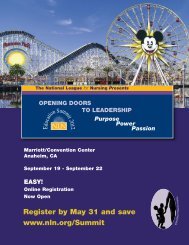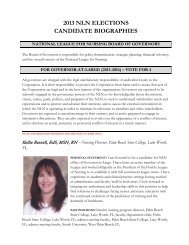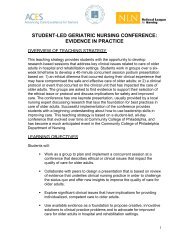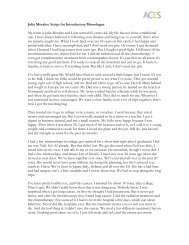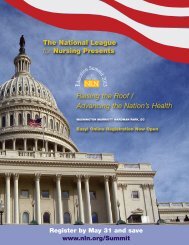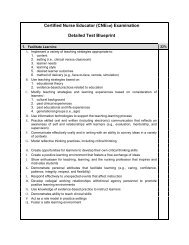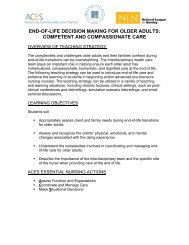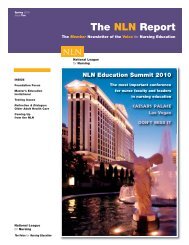Instructor's Toolkit for Henry William's Monologue Henry's ...
Instructor's Toolkit for Henry William's Monologue Henry's ...
Instructor's Toolkit for Henry William's Monologue Henry's ...
Create successful ePaper yourself
Turn your PDF publications into a flip-book with our unique Google optimized e-Paper software.
Instructor’s <strong>Toolkit</strong> <strong>for</strong> <strong>Henry</strong> William’s <strong>Monologue</strong><strong>Henry</strong>'s introductory monologue can be used in a variety of ways. Here are a few to consider:• large class discussion• small group discussion during class or clinical• reflective journaling assignment• web-based assignment: listen to the audio or read the script, then discuss and summarize thegroup’s conclusions.Here are some questions that might be used to stimulate discussion:1. What are <strong>Henry</strong>’s strengths?2. What are your concerns <strong>for</strong> this patient?3. What is the cause of your concern?4. What in<strong>for</strong>mation do you need?5. What are you going to do about it?6. What is <strong>Henry</strong> experiencing?These questions were adapted from the following publication: Benner, P., Sutphen, M., Leonard, V.,Day, L., and Shulman, L. (2010). Paradigm case: Lisa Day, classroom and clinical instructor.In Educating nurses: A call <strong>for</strong> radical trans<strong>for</strong>mation (p. 133). San Francisco: Jossey-Bass.Possible answers to questions:1. Strengths – wife and family, connections to the community, able to manage medications,beginning to recognize need <strong>for</strong> assistance.2. Concerns – wife’s increasing memory lapses, loss of their son, sense of anxiety, possibledepression, caregiver strain.3. Cause of concern – anxiety, loss of sleep, frustration with wife’s increasing dependence onhim, possible financial problems, especially medication expenses.4, 5. Needed in<strong>for</strong>mation and next steps:• Learn more about <strong>Henry</strong>’s cardiovascular disease and the extent of his COPD.• Explore available resources <strong>for</strong> <strong>Henry</strong> and Ertha? Could they go to an adult day care,or a senior citizen’s center <strong>for</strong> meals and an outing?• Determine the degree of Ertha’s memory lapses.
• Assess <strong>Henry</strong> while he is in the hospital. Connect him with resources through socialservices, pharmacy, and respiratory therapy.• Assess need <strong>for</strong> home care, nursing home, or assisted living care.6. <strong>Henry</strong> is experiencing an acute exacerbation of COPD and he is stressed. He needs followup on medications and teaching <strong>for</strong> oxygen and new medications. He may be lonely andneed help with decision making.The Essential Nursing Actions from the ACES Framework can serve as a guide to learners whendeciding what interventions may be appropriate <strong>for</strong> the older adult in this situationACES FrameworkEssential Nursing ActionsAssessFunctionandExpectationsCoordinateandManageCareUseEvolvingKnowledgeMakeSituationalDecisions• Assess the older adult’s individual aging pattern and functional status usingstandardized assessment tools.• Use effective communication techniques to recognize, respond to, and respectan older adult’s strengths, wishes, and expectations.• Include findings of assessment of older adult’s cognition, mood, physicalfunction, and com<strong>for</strong>t to fully assess the individual aging pattern.• Manage chronic conditions, including atypical presentations, in daily life andduring life transitions to maximize function and maintain independence.• Assist older adults and families/caregivers to access knowledge and evaluateresources.• Advocate during acute exacerbations of chronic conditions to preventcomplications.• Understand geriatric syndromes and unique presentations of common diseasesin older adults.• Access and use emerging in<strong>for</strong>mation and research evidence about the specialcare needs of older adults and appropriate treatment options.• Interpret findings and evaluate clinical situations in order to provide high qualitynursing care based on current knowledge and best practices.• Analyze risks and benefits of care decisions in collaboration with theinterdisciplinary team and the older adult and family/caregivers.• Evaluate situations where standard treatment recommendations need to bemodified to manage care in the context of the older adult’s needs and lifetransitions.• Consider the older adult’s wishes, expectations, resources, cultural traditions, andstrengths when modifying care approaches.


